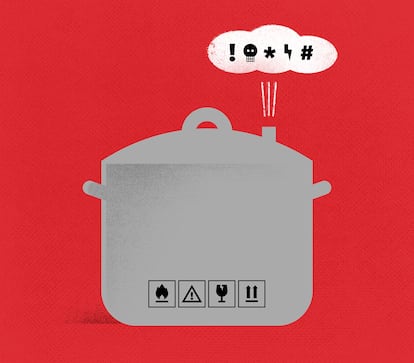Three steps and 90 seconds to de-escalate rage
Lawyer and mediator Douglas E. Noll, who has worked in high-security prisons, offers a prescription for defusing an anger-filled situation

We all witness other people fly off the handle from time to time. It could be someone lashing out at another driver from behind the wheel, or perhaps a neighbor complaining about the noise in the next apartment. However, it can also be people closer to us that we cannot ignore. The outburst can come from a boss, our partner, or even our children. If we react similarly, we will only escalate the conflict, which usually results in emotional wounds that are difficult to heal. But what can you do, then, when someone is losing it? Lawyer and mediator Douglas E. Noll, who has worked in high-security prisons, provides an answer in his book De-Escalate, where he states that the tension can be lowered in 90 seconds or less through the following three steps:
1. Ignore the words. Instead of paying attention to what someone says, it is much more important to listen to the emotions behind it. According to Douglas E. Noll, our brains are trained to focus on a single task. Thus, when we consciously choose to ignore words, we are freeing up our brain’s processing power to focus on emotions. In addition, when someone is very angry, they usually say hurtful things that they will regret later. If we take these words seriously, our own emotions will lean towards anger and we will escalate the conflict. If, instead of paying attention to the insult or the belittlement, we recognize the emotion that the other person is experiencing, it will be much easier for us to get out of the tight spot. This brings us to the second point.
2. Identify the other’s emotional experience. Beyond the words, the question is: what is the other person feeling? As empathic beings, we can know this naturally. The author proposes to direct our radar to six fundamental emotions of the negative spectrum: anger, fear, anxiety, disgust, shame-humiliation or abandonment-rejection. Without having to rationalize, everyone can identify which of these emotions a furious person is experiencing. Identifying it will facilitate the resolution of the conflict, as we will see below.
3. Reflect emotions with a second-person sentence. Douglas E. Noll suggests reacting with simple statements like “you are angry” or “you are disappointed.” Even if we fail to pinpoint the specific emotion, we will not make things worse. The other person will correct us by saying something like “I’m not mad, I’m frustrated!” By repeating their choice of words, they will feel recognized and will begin to de-escalate. The opposite happens when we use the first person (“I think you…”), because then the other will feel questioned and attacked. We have to take the ego out of the equation.
In his three-step method, the author of De-Escalate advises that, when labeling emotions, we look for three things in the other person:
Verbal response. Feeling understood, the other person may say “yeah” or an emphatic “yes” that shows that we have connected with them.
Dropping shoulders. When someone is angry, they tense and raise their shoulders. As they calm down, they relax and drop them. This would be another unconscious sign of de-escalation.
Sighing or exhaling. These and other signs of relaxation tell us that the person in front of us is calming down.
In his book, Douglas E. Noll shares a simple example of affect labeling between two friends, one acting as a speaker (S) and the other as a listener (L).
S: My husband doesn’t listen to me. He just comes home and turns on the television.
L: You are frustrated and feel disrespected.
S: Yeah! And anytime I ask him how he is feeling, he completely shuts down.
L: You are frustrated and sad because he will not connect with you.
S: It can be so lonely at times. It’s like we are living in two universes.
L: You are lonely and sad, and you feel unloved.
S: Yeah, that’s it exactly. Thanks for listening to me.
As the speaker feels understood, we will observe how they nod their head, their shoulders drop and they even let out a sigh of relaxation. If we help others to de-escalate, in addition to saving ourselves unnecessary problems, we will contribute to creating a climate of greater kindness and empathy in our environment.
Sign up for our weekly newsletter to get more English-language news coverage from EL PAÍS USA Edition
Tu suscripción se está usando en otro dispositivo
¿Quieres añadir otro usuario a tu suscripción?
Si continúas leyendo en este dispositivo, no se podrá leer en el otro.
FlechaTu suscripción se está usando en otro dispositivo y solo puedes acceder a EL PAÍS desde un dispositivo a la vez.
Si quieres compartir tu cuenta, cambia tu suscripción a la modalidad Premium, así podrás añadir otro usuario. Cada uno accederá con su propia cuenta de email, lo que os permitirá personalizar vuestra experiencia en EL PAÍS.
¿Tienes una suscripción de empresa? Accede aquí para contratar más cuentas.
En el caso de no saber quién está usando tu cuenta, te recomendamos cambiar tu contraseña aquí.
Si decides continuar compartiendo tu cuenta, este mensaje se mostrará en tu dispositivo y en el de la otra persona que está usando tu cuenta de forma indefinida, afectando a tu experiencia de lectura. Puedes consultar aquí los términos y condiciones de la suscripción digital.








































